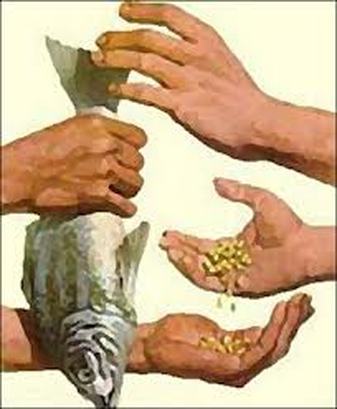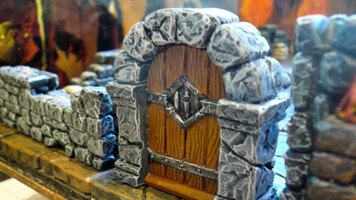 Gamer Forge Listener Email: Name Wax Eagle Comment I'm currently working on a homebrew system and one concept I was intending to incorporate is that there is no in-game currency; items are traded using a barter system. The thing is, how do I set a 'base price' to measure the worth of an item against? For example, how do I indicate that generally a sword is worth 3 skins worth of water but a dagger is only worth 1? I had thought to have units of water as a base price for every item of equipment, but then that just seems to be changing one currency for another. Are there any systems with a similar mechanic? Gamer Forge Response: This week, the DCR crew got an e-mail concerning the use of the barter system. Who runs Bartertown? DCR says: 1. Determine the most valuable commodity. Is it water? Is it metal? Wood? You need to determine the preciousness something that everyone wants. The Dark Sun game setting places metal as the high end resource. That effectively becomes that world's version of gold. In the Mad Max films, water and gasoline are more precious than anything. Value of commodities goes down from there. Don't worry about setting prices for something, because the barter system doesn't price goods, because the value of goods depends entirely on the individual needing them. 2. Just how willing are you to part with "X"? If your characters are desperate for that last box of Twinkies, they must be willing to part with something they have, because money doesn't exist. In the film, Book of Eli, Denzel Washington has to part with his material goods in order to get enough water for his journey. This is the very core of the barter system: personal value. So, in order to emphasize the need for such value, have the players keep meticulous track of their goods, because those goods are now their money. When situations arise that require them trade for new goods, take a quick peek at their sheets so a level trade can occur. Don't necessarily exploit that personal value they place, but keep it in context with the world in which they play. Just because a player values a magic shield, doesn't mean the trader wants the magic shield. Maybe that last skin of water or last day's worth of rations is way more appealing... 3. It works both ways. Players need to be able to examine the resources of the immediate area and the landscape. A dwarven city won't have much use for rough cut gems, while a river town may not have need for fresh fish. Just keep the descriptions of the areas your players visit so that the needs of the people come into play. This big detail helps breathe more life into your campaign world by showing just how the world revolves while they're not around. Lastly, the barter system is NOT an exact science.  Gamer Forge Listener Email: Name Devin Patchery Comment Here's the situation. There's a locked door that prevents any further progress into the dungeon. There's a keyhole in the door and a message basically saying that the key needs to be wished for. In the room with the locked door is a wishing well. Each person is limited to one wish, and successive attempts just inflict damage to the wisher. It's very straightforward: someone needs to wish for the key and it will appear, and they can unlock the door. The intent was not to present the players with a complex puzzle or anything time-consuming. The intended effect was that all but one player get a free wish, but one person has to sacrifice their wish to get past the door (and later be rewarded for their selflessness). But, as always, things did not go according to plan. Without even discussing the key, each character went ahead and made their selfish wish. Okay, no big deal. You can brute force the door or just break it down with an axe. But my players are terrified that something awful will happen if they destroy the door, even though I have done nothing to indicate this. They've tried wishing for the key, but since they all expended their wish, the well just damages them and doesn't work. So they've now set their mind to solving this puzzle that doesn't exist. They are trying to find deeper meaning in the words on the door, trying to word the wish more precisely, taking unnecessary damage all the while. The last 30 minutes of our session was spent on this. Now I'm all for causing a little party frustration. But it's starting to drag on. I want to explain to them that they've simply exhausted their wishes and need to find an alternative way to get past the door. I want to smack the fighter over the head and tell him to just bash it down. But that's not the way I roll (heh, heh). I would provide subtle clues - the magic aura of the wishing well fades, or something along those lines, but the damage has already been done. They've inspected the well and the door and I've already told them that there is nothing different about it. How can I get my players to overcome this obstacle without just telling them outright? Gamer Forge Response: We love this situation! We really do! When players are stuck between a keyhole and a wishing well, DCR says: 1. Well, duh! You gave players a free wish. Was any other outcome truly expected? Indeed, the DCR Ten Commandments state: Thou shalt respect the consequences of thine actions. Your players were given an open invitation to solve this challenge and they squandered it. But let's go back a bit. No, it's not too much to expect that adventurers will have a few moments of altruism and selflessness. The outcome of this situation can help illustrate the importance of thinking beyond munchkin-ing out their character sheets. 2. A funny consequence may be to have another adventurer NPC walk out of the locked room holding some generic loot and show them what they missed out. Remember, that this is a moment of consequence, so they shouldn't even get an opportunity to mug the NPC and jank the loot, because that just bypasses the challenge. Also, don't get preachy about it. Once they see what they missed out on, just move on with the adventure. They won't hold it against you if you don't keep holding it against them. 3. The deep part: Does the rest of your adventure hinge on getting what's behind the door? There doesn't seem to be any reason why your story can't just move on somewhere else. Remain mindful, Dungeon Master, that you are running a game and are responsible for keeping things moving. If players make too much noise in the room, have something sneak up behind them and attack, or do something to get them moving along. *Bonus XP: Most films and books that deal with an apocalypse or some kind of global context as part of it's setting are a great place to start looking at how a barter system works. Mad Max, The Book of Eli, The Road, The Hunger Games, and District 9 are all settings that involve the use of a barter system. Just find your commodity and transplant it into your game's setting. To get a very real look at bartering, imagine what it would be like on a deserted island with the adventurers. Money loses value quickly while resources and small, everyday contrivances take over as the new gold.
0 Comments
Leave a Reply. |
The GamerForge is DungeonCrawlersRadio’s most favoritist segment of the entire show. Have you ever had a boggling rules question that no one in the group can figure out? Write in to us and we’ll help try to solve it! Are you a Game/Dungeon Master who needs help squashing animosity at the table or dissension in the ranks? Perhaps we can help!
If you are in need of help, encouragement, or an uber devious way to get a TPK, we are here to help. No matter your needs, we’ll help you get more from your gaming! The Gamer ForgeWhere Players & Game Masters can come for valuable information to level up your game! Archives
August 2013
Categories
All
|
 RSS Feed
RSS Feed








